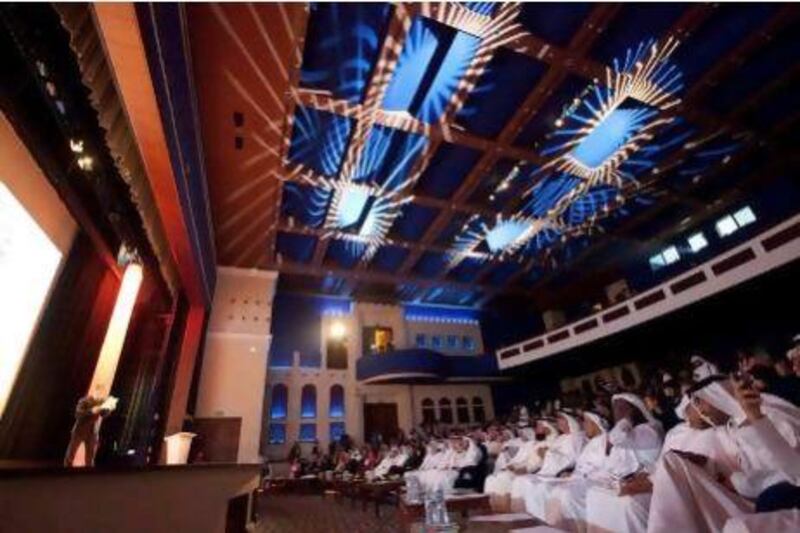The five-day Emirates Airline Festival of Literature event concluded in Dubai last night after another year of stellar guest speakers. The event hosted 100 authors from 25 countries as they discussed their work through panels, "In Conversation" sessions, masterclasses and a literary quiz.
As a result, the festival venue, the InterContinental in Dubai's Festival City, was as much a five-star learning institute as a hotel.
The big-name authors themselves seemed to be just as excited to be in Dubai. For the British author David Nicholls, the chance to escape the dreary London weather was a major draw in coming to the UAE.
However, as he mentioned in his In Conversation session, Nicholls may have a price to pay for leaving his family in London's miserable gloom.
"I went to the town today and I thought I better make it up to them," he confessed. "I heard that Dubai is famous for its gold and all I got for them so far was a box of dates. So I need to find another justification for taking off for five days and coming to this wonderful place."
Nicholls said the popularity of his latest work, One Day, continues to surprise him, as it was written at a time when he felt his career was slipping.
"I was heading on a downwards trajectory and I thought One Day would continue that," he said. "So this has been a great surprise. But I did love writing it; it is a personal book and something I am proud of. I had no expectations of any of this, but it has been a great journey."
The legendary Palestinian poet Mourid Barghouti said it is precisely from this uncomfortable place that good literature is born.
Speaking to a packed crowd, including fellow award-winning poets Yang Liam and Daljit Nagra who came to listen to the master, Barghouti debunked the notion that poetry is written in times of reflection and calm.
Instead, he argued, poetry relies on observation and the ability to feel the most extreme emotions.
"Some people think that poetry comes along when a person enjoys life, is on the beach, in the jungle, in ecstasy or in a comfortable place. No, this is an illusion, a distraction," he said. "In reality, poetry is to be exact and attentive. It is to see everything the naked eye can see and to feel everything with your nerve endings. Poets can't say, 'This has slipped my mind'. I remember I saw this wink from a woman at a wedding when I was a child. I wrote a poem about that moment 25 years later."
Indeed, the loaded terms "creativity" and "writing process" were a major talking point throughout the festival: the Dubai author Liz Fenwick stressed the need to write the first draft frenetically and historical fiction author Charles Ellingworth spoke of the importance of research when fashioning a story.
But for the young fiction writer David Almond, the terms "creativity and things like originality" have grown to become the bugbear of writers. He dedicated his masterclass, Creativity Demystified, to diluting the power of such notions.
"These words are terrifying and block real creativity," he said in his opening address. "The fact is creativity is in all of us, it is easy to access because we are all human and it is in fact what makes us human."
Through a series of exercises, Almond encouraged his students to create a character, context and mood before going to write the first page of the story.
"Isn't it amazing?" he smiled. "Before we had nothing, now we have created a new world."
Located in a hidden corner of the hotel, the festival's Green Room served as an oasis for the authors, where they could replenish and conduct interviews with the press.
While some authors feverishly prepared for their appearances, including holding rehearsals of their sessions in empty halls, others were more content to eat or stare into space before their big stage moment.
Perhaps the philosopher AC Grayling was the most well prepared, sitting in the corner by himself and reading the papers hours before his session Philosophy and the Good Life.
While writers such as Grayling and the crime writer Mark Billingham were blessed with receptive crowds, there was little doubt which author had to work hardest at reaching out to his audience. The child author Andy Stanton had to first rouse his pint-size audience to enthusiasm by running around the stage, screaming, whooping and even playing the harmonica. The result was a joyful session where children asked dozens of insightful questions about books and writing.
"Why should we read?" a six-year-old asked.
"Because it is good for your head," Stanton replied.
It made perfect sense to all of us.
sasaeed@thenational.ae
Emirates Airline Festival of Literature worked its inspiring magic
The five-day Emirates Airline Festival of Literature event concluded in Dubai last night after another year of stellar guest speakers.

Editor's picks
More from The National






